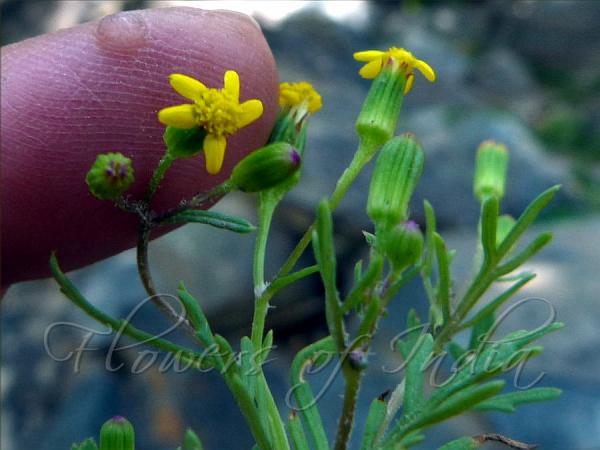|
| Hindukush Senecio |
|

|

| File size | 145867 |
| Original date | 6/22/15 1:54 PM |
| Resolution | 900 x 675 |
| Flash | Flash did not fire, auto |
| Focal length | 4.5mm |
| Exposure time | 1/100s |
| Aperture | 4.0 |
| Focus Distance | |
| Metering Mode | Multi-segment |
| Camera make | Panasonic |
| Camera model | DMC-FZ40 |
| Sensor type | OneChipColorArea |
|
|
|
|
Photo: |
Botanical name: Senecio krascheninnikovii Family: Asteraceae (Sunflower family)
Synonyms: Senecio hindukushensis, Senecio kashmirianus
Synonyms: Senecio hindukushensis, Senecio kashmirianus
Hindukush Senecio is an annual herb with leaves cut
into linear segments and yellow flower-heads with 4-7 ray florets.
Flower-heads are few to many, at branch-ends, in lax corymbs;
flower-cluster-stalks 1-3 cm, slender, rather densely to sparsely white
velvet-hairy; bracteoles 2-4, linear-subulate. Involucres are narrowly
bell-shaped, 5-7 × 1.5-4 mm, calyculate; phyllaries 13-15, linear or
linear-lanceshaped, 0.3-0.5 mm wide, herbaceous, with narrow membranous
margins, hairless, tip pointed-tapering, sometimes dark tipped. Ray
florets 4-7; flower tube 3-3.5 mm; blade yellow, oblong, very short,
2-2.5 mm, hardly exceeding involucre, 4-veined, apically 3-finely
toothed, becoming curled. Disk florets are many; flower yellow, about
5.5 mm, with about 3 mm tube and narrowly funnel-shaped limb. Stems
are erect, 5-30 cm tall, branching from base or in upper part; branches
erect or divaricate-spreading, slender, sparsely velvet-hairy or nearly
hairless. Leaves are stalkless; blade ovate-oblong, 1.5-5 × 0.4-1.5 cm,
both surfaces sparsely velvet-hairy to nearly hairless, base slightly
dilated and somewhat stem-clasping, pinnatifid to finely and deeply
pinnatisect with 4-8 usually narrow, linear, irregularly finely toothed
or entire lateral lobes, tip blunt to subpointed. Upper leaves are
smaller, pinnately lobed to linear and subentire. Achenes cylindric,
2.5-3 mm, sparsely adpressed velvet-hairy. Pappus white, about 5.5 mm.
Hindukush Senecio is found on gravelly slopes, sandy places at
altitudes of 1800-3900 m, in NE Afghanistan, NW India, Kazakhstan,
Kyrgyzstan, Pakistan, Russia, Tajikistan; SW Asia (Iran). Flowering:
June-September.
| Identification credit: Krishan Lal, Varun Sharma | Photographed in Lahaul, Himachal Pradesh. |
• Is this flower misidentified? If yes,